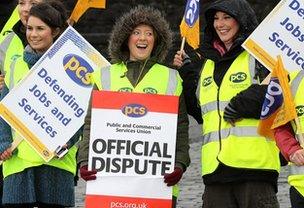Striking while the iron is cool
- Published
- comments

Allow me to begin with what will be dismissed by many as a ludicrous proposition: there are some in the government who are privately disappointed that today's protests are not much bigger.
Yes, of course I know that the last thing ministers say they want is disruption and strikes that cause widespread inconvenience and make the job of deficit reduction even harder.
But if there is a surprise at the action today, it is that we haven't seen more of it. And as I shall explain, I think for some in Downing Street, that is a bit of a worry.
When the budget cuts were announced back in 2010 there was an acceptance that austerity, once it started to bite, would be greeted by widespread public anger. Government unpopularity at this point in the cycle was a given and the big question was how the British population would make their fury felt.
For a moment last summer, people wondered whether the English riots were the start of it. But it quickly became clear the looting and disorder had very little to do with cuts or welfare reform.
Then the focus shifted to the Occupy movement - was that going to be the rallying point for broad-based public anger? It would appear not.
The small-scale rallies and demos which pop up on the front page of local papers don't seem to be part of an identifiable protest movement. Today's national strikes over pensions and the police march over conditions of service seem to reflect the narrow self-interest of public workers rather than the vanguard of a more general outcry.
At first sight this might suggest to some that the government has "got away with it". Britain feels more resigned than furious at the impact of austerity. Although the coalition took a kicking in last week's local elections, if the nation really wanted to scream their opposition to cuts and reforms, why did two-thirds of the electorate in England not even bother to vote?
And this must worry David Cameron and some of his closest advisors. Why? Because we have a prime minister whose central mission is the idea of building an active citizenry.
He wants to see armies of armchair auditors checking on public spending and creating a fuss if they don't like what they see; he wants grassroots activism to shape planning and development; he wants real power to flow from the Whitehall elites to the ordinary Joes and Josephines in parishes and wards; he wants a Big Society where citizens get involved in their local communities.
Instead, some of his advisors privately despair at a population that appears to count the cost of democracy rather than understanding its value.
My guess is that they imagined the pain of the cuts would wake people up to their democratic rights. While disagreeing with those who oppose their policies, of course, I suspect they thought this period in our politics might also represent an opportunity to rouse a populace that has come to regard itself as consumer rather than citizen.
David Cameron may pat himself on the back for so successfully making the case that deep public sector cuts are a necessity. But there may also be part of him that is disappointed the argument was so easily won.